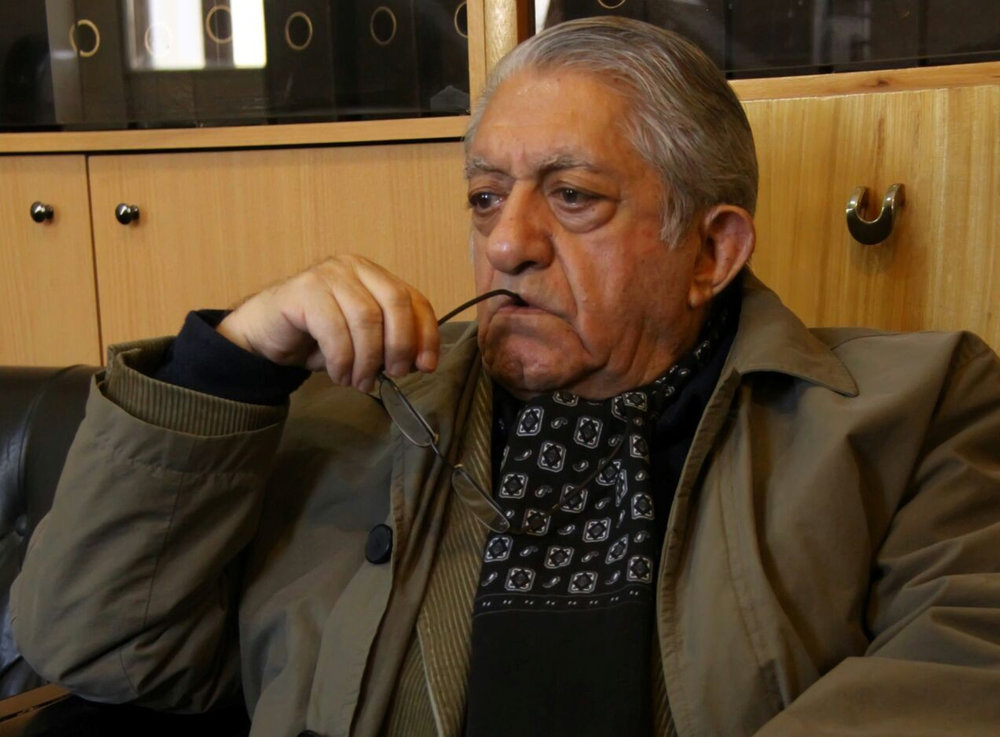“Master actor” Ezzatollah Entezami dies at 94

TEHRAN – Ezzatollah Entezami, the veteran actor of stage and screen who was named “master actor” in his memoirs written by Hushang Golmakani, died at Tehran’s Bahonar Hospital on Friday. He was 94.
His son, Majid, confirmed the news in a call to IRNA on Friday morning.
He was one of Iran’s golden generation of actors such as Mohammad-Ali Keshavarz, Ali Nasirian and Jamshid Mashyekhi, who began his career in acting with traditional Iranian performances at theaters located on Tehran’s Lalezar Street, which was considered as Iran’s Broadway during 1950s and 1960s.
Entezami made his acting debut in “The Spring Variety” directed by Parviz Khatibi in 1949.
He rose to fame in 1969 by his portrayal of Mash Hassan in director Dariush Mehrjui’s acclaimed drama “The Cow”, which was among the forerunners of the Iranian New Wave cinema.
Appearance in over 50 movies and dozens of theatrical performance brought him numerous honors. He won four Crystal Simorghs awards at the Fajr International Film Festival, Iran’s most prestigious film event, for his roles in “Grand Cinema”, “The Day of the Angel”, “A House on Water” and “The Marsh”.
In September 2006, UNESCO honored Entezami for his lifetime achievements at its headquarters in Paris, where Golmakani delivered a speech.
In 2012, he handed over his house to the Tehran Municipality to convert it into a museum, which is now a favorite haunt of theater students, young thespians and journalists.
Entezami moved more to the center stage of the Iranian cultural arena in 1997 when film critic and writer Golmakani wrote his memoir, “Master Actor”.
Afterwards, he was referred to as the “master actor” and “the honor of Iranian cinema.”
His life story also turned into a subject of the documentary “… and the Blue Sky” by Ghazaleh Soltani in 2010. She also published Entezami’s biography in “I’m Ezzat, Born in Sangalaj” in 2014.
“What has been depicted in the film coincides perfectly with my real life,” Entezami said after watching the documentary during its premiere in Tehran in October 2010.
Iranian cineastes and cultural officials sent messages on social networks offering their condolences over Entezami’s death.
“Iranian art lost one of its best and most distinguished in morals and professional manner, and we have no replacement for him,” said director Mehdi Sabbaghzadeh, who worked with Entezami in “The Quiet Home” in 1991.
“He dedicated almost seven decades of his life to playing various roles on stage and screen, creating memorable moments for Iranian people and became an eternal figure in the country,” Culture Minister Seyyed Abbas Salehi wrote in his letter of condolences.
In a statement published on Friday, Cinema Organization of Iran director Mohammad-Mehdi Heidarian called Entezami “a great popular artist” who shared all his happy moments with his people.
IRIB director Abdol-Ali Aliasgari wrote, “Ezzatollah Entezami created a lot of good memories for several generations and made many roles eternal in the minds of the people of his homeland.”
Foreign Minister Mohammad Javad Zarif and Foreign Ministry spokesman Bahram Ghasemi were also among the officials who sent messages of condolences over the death Entezami.
Entezami is survived by his sons, Majid, Shahab and Ramin.
Colleagues and fans are scheduled to attend a meeting in the courtyard of Tehran’s Vahdat Hall on Sunday morning to bid farewell to Entezami who will be buried in Behesht Zahra Cemetery.
Photo: Actor Ezzatollah Entezami in an undated photo
MMS/RM/YAW
Leave a Comment